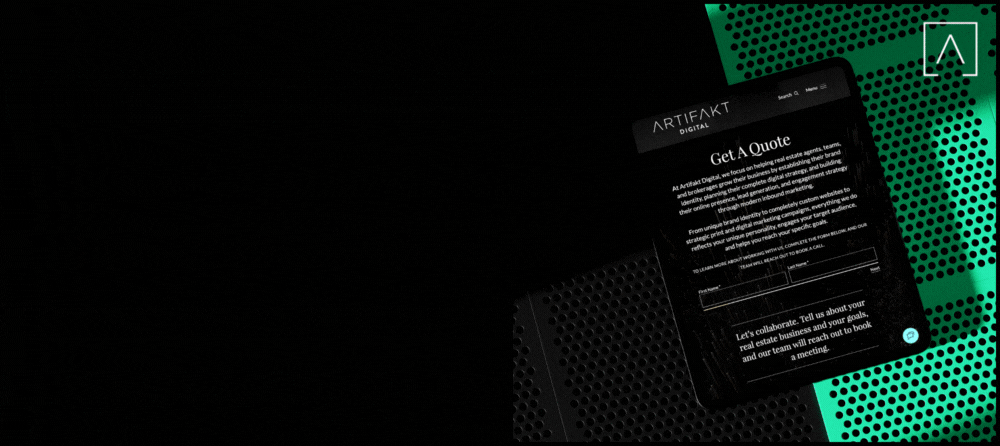Your marketing strategy is never finished. To see continued success in your marketing efforts, you have to periodically look at what you’re doing, determine what’s working and what isn’t working, and introduce change accordingly.
Sometimes you might need to make bigger changes, like completely overhauling your entire marketing strategy or going all in on digital (when maybe you’ve never done that before), or you might need to make smaller changes, like introducing a new advertising campaign or updating your logo and branding, but no matter what changes you make, know that change should continually be happening.
After all, continued investment in your marketing strategy is continued investment in your business.
As you plan for 2024, here are some of the things you might want to consider building into your own overall marketing strategy.
Invest in a Solid SEO Strategy
While planning for search isn’t anything new, in 2024, it’s more important than ever before to have a solid Search Engine Optimization (SEO) strategy in place so you can show up at the right time, in the right places, for the right searches and reasons. With the introduction of AI and new Google’s generative search results, this year and into the next, building a solid SEO strategy has never been more important.
Most people are relying on search to make decisions before they do anything, and if you and your business can’t be found in search, it’s essentially like you don’t even exist.
Any other agents that display in search results that you’re trying to rank for ahead of you have a big advantage over you. Even a less experienced agent with more exposure in search has a chance to build a great business and perhaps even take some of your potential business away from you.
A well-thought-out SEO strategy will build your online presence, raise your domain authority, and be a key part of your overall lead generation strategy. Building out a solid SEO strategy takes a lot of time, a lot of effort, and a lot of knowledge, so the sooner you get started the better.
★ Want to learn more about SEO? Have a look at these posts and resources:
- Building a Well-Rounded SEO Search Strategy for Your Real Estate Website
- Does Using AI-Generated Content Negatively Affect Your SEO Strategy?
- Why Building Trust is a Key Part of a Successful SEO Strategy
- Using Pillar Pages to Make Old Content More Accessible
- How Being Authoritative Can Bring You More Quality Website Traffic
- Download Our SEO Strategy Building Guide for Real Estate Agents
The More Niche the Better
2023 was a big year for change in real estate, and towards the end of the year, as rates increased and listing supply dwindled, multiple real estate markets saw a slowdown in transactions; but even in a slower market, there’s still opportunity for those willing to adapt their strategy. And that immediate opportunity, and opportunity into the new year, lies in having a niche.
The biggest reason building a niche works is it allows you to separate yourself from your competition by focusing on a specialization because in most cases, someone would rather work with an agent that has a specialization than just any generic agent that works with everyone, everywhere, anytime.
As an agent, there are a lot of niches you could specialize in, the most obvious being geographical (like a neighborhood), type of property (like hard lofts), or demographic (like growing families or downsizers)
But, you could even take building a niche a step further and, instead of focusing on working with someone when they want to transact, rather, focus on working with them when they need to transact.
For example, building a niche around specific situations people are in when they absolutely must do a transaction, can help you build a specialization that’s somewhat market-proof, no matter what happens. And again, as an agent, there are a lot of specific niches you could specialize in, like relocation, selling the family home when downsizing, working with military members, etc.
Going into 2024, people will value specialization more than ever, so the more you can build it into your marketing message, the better.
★ Want to learn more about building a niche? Have a look at these posts:
- The Power of Specialization in a Low Listings Market
- Carving a Niche to Get Better Real Estate Leads
- Building a Hyper Local Real Estate Marketing Strategy
- Why Your Website and Your Marketing Strategy Go Hand-in-Hand
Highly Personalized Marketing
In 2024, building marketing relationships will be more important and effective than ever when it comes to seeing success in your marketing strategy, and one of the best ways to do that is by making sure your marketing feels highly personalized.
Building personalization into your marketing strategy is a key part of establishing trust with your target audience, showing them you care and you’re here to help, and eventually, turning them into clients because of your effort.
Effective personalization means making someone feel like your marketing was created just for them, as much as possible; and that goes far beyond just addressing them by name (which you should of course).
Personalized marketing is all about getting the right information to the right people when it matters most. For example, instead of sending a general email newsletter, you could identify specific details and interests of people in your database and send out multiple email newsletters that are more specific to smaller groups of people, like potential sellers that live in a certain neighborhood or marketing a new condo building that’s perfect for first-time homebuyers. If your marketing speaks to the scenario they’re in, it’ll feel much more curated and personal, and be more effective.
The more you can make someone feel like something was created specifically for them, the more likely you’ll build a meaningful marketing relationship with them, and the more likely they’ll choose to work with you; and in the new year, that will be more important than ever.
★ Want to learn a bit more about personalized marketing? Have a look at these posts:
- Using Personalized Marketing to Get Better Engagement (and Leads)
- Why Personal, Targeted Marketing Means Better Real Estate Leads
Explore Inbound Marketing
Over the course of the past few years, we’ve worked with a lot of agents to introduce inbound marketing into their overall marketing strategies, and because of that, they’re seeing better, more quality driven results.
And into 2024, inbound marketing will continue to be a powerful component of a strong real estate marketing and lead generation strategy.
What’s the difference between inbound and outbound marketing?
- Outbound Marketing is a cold reach out to people to try to make them interested in working with you. For example: billboards and bus bench ads, cold email reach outs, cold calling, and door-knocking are all outbound marketing techniques.
- Inbound Marketing is when is when you attract and build meaningful, long-lasting connections and bonds with people through providing valuable content, resources, and experiences, and then nurturing them until they’re ready to make a decision. For example, blog posts, search engine strategy, and downloadable resources are all inbound marketing techniques.
When properly set up, inbound marketing can be extremely powerful and can serve as a strong part of your overall quality lead generation strategy for a long time to come.
But why is that?
It’s because the people that engage you, after being brought in by your inbound marketing strategy, will already want to work with you when they’re ready to buy or sell. They’ll remember you, your brand, and your business, and in a lot of cases, they won’t consider working with anyone else because they already trust you.
An inbound marketing strategy is made up of 3 main stages: Attracting, Engaging, and Delighting. You can learn more about how it works in this post called: The Philosophy of Inbound Marketing, and Why it Works for Agents
Effective inbound marketing involves actually caring about your potential clients, providing the information they need, engaging them, and delighting them as they go through the decision-making process, and even beyond as you keep them in your marketing ecosystem.
★ Want to learn more about inbound marketing for real estate? Have a look at these posts and resources:
- Planning a Real Estate Lead Flow Through Inbound Marketing
- Building an Inbound Marketing Strategy to Get Higher Quality Leads
- Using Familiarity in Your Marketing Strategy to Get More Business
- Building a Real Estate Marketing Stickiness Strategy
- Establishing a Successful Marketing Mix In Your Website Acquisition Strategy
- Download Our Inbound Marketing Guide
Education and Empowerment
As of late, a lot of the news people read (especially about real estate) seems to be negative (and even sensationalized). People aren’t sure what to do, when to do it, or who to believe. People don’t seem to trust other people as easily, and they trust marketers even less.
That’s where empowerment comes in; empowering people with the right information can help you build trust with them.
Having an empowerment strategy in place means being helpful, truthful, and honest, by giving people the right information, so they can make a decision, even if it means working with someone else.
In an age where information constantly needs to be fact-checked for accuracy, this honest approach can be really meaningful, and it can play a big part in getting the right people to work with you, and the wrong ones to choose someone else.
Empowering people to help them make smart, informed decisions through education by providing them with the information and tools they need to make those decisions really works. For example, any agent can just repost the monthly sales stats, but instead, if you wrote a longer, more detailed blog post each month, that broke down the market stats, and advised people on whether or not it was actually a good time to buy or sell, that’d be a lot more useful. You’d be building authority as someone who can be trusted and understands the market by putting out more detailed information that helps people make decisions that aren’t always in your favor.
People have always wanted to work with people that they like and people that they trust, but in 2024, it seems to be more important than ever. Through empowerment and education, you can win some of that trust from them, and eventually, their business.
★ At Artifakt, education and empowerment are part of our core values (which is the main reason for our blog and all of our downloadable resources). You can learn more about what that means to us right here.
AR, VR, and MR
As we move into 2024, there are a lot of companies pushing the boundaries of AR (augmented reality), VR (virtual reality), and MR (mixed reality); and all of them are determined to find ways to make the technology useful in our day-to-day lives. (You can learn more about these technologies here).
When it comes to real estate, these technologies have several practical applications, but the 2 biggest are probably around helping people solve 2 pain points: 1. their physical location and 2. their imagination.
For the physical location pain point, VR can make it easier for someone to buy a property they may not be able to see in person. While high-res pictures, a fly-through video, or a 3d walkthrough tour can help, they aren’t as fully immersive as VR is, and they don’t make someone feel like they’re actually there. A VR experience just feels more “real”.
For the imagination pain point, a lot of people aren’t able to see past what a home currently looks like and can’t imagine what it could look like; and that’s a problem AR can solve. It can help nudge stubborn buyers that aren’t able to look past an outdated kitchen or an unfinished basement by showing them the potential of what it could look like. It can also help you close more listings, by allowing a client to virtually walk through one of your staged listings for a more immersive experience, rather than just showing them flat pictures.
No one knows for certain where AR, VR, and MR will take us; we only know that a lot of companies are looking for ways to build it into our day-to-day lives, and as a modern real estate agent with a modern marketing strategy, there are a lot of practical applications where these technologies can help make a transaction smoother, especially once Apple releases it’s long-awaited Vision Pro device coming out early 2024.
★ Want to learn more about technology in real estate? Have a look at these posts:
- When to Build Virtual Staging into Your Listing Marketing Plan
- How QR Codes Became Relevant in Real Estate Marketing
- Why Proving Your Digital Competence Will Win You Your Next Client
Adapt, Pivot, and ABC (Always Be Changing)
No matter what 2024 brings, one thing is absolutely true: real estate marketing is always changing, and so, your real estate marketing strategy should also always be changing by including things that work, and mixing in a few things that might work.
Regardless of how you look at it, continued investment in your marketing strategy is continued investment in your business.
Wishing you a busy and successful 2024!
Want to learn more about what Artifakt Digital can do and how we can help your business get ahead of the competition? Book a no-obligation consultation call with our team quickly and easily.




